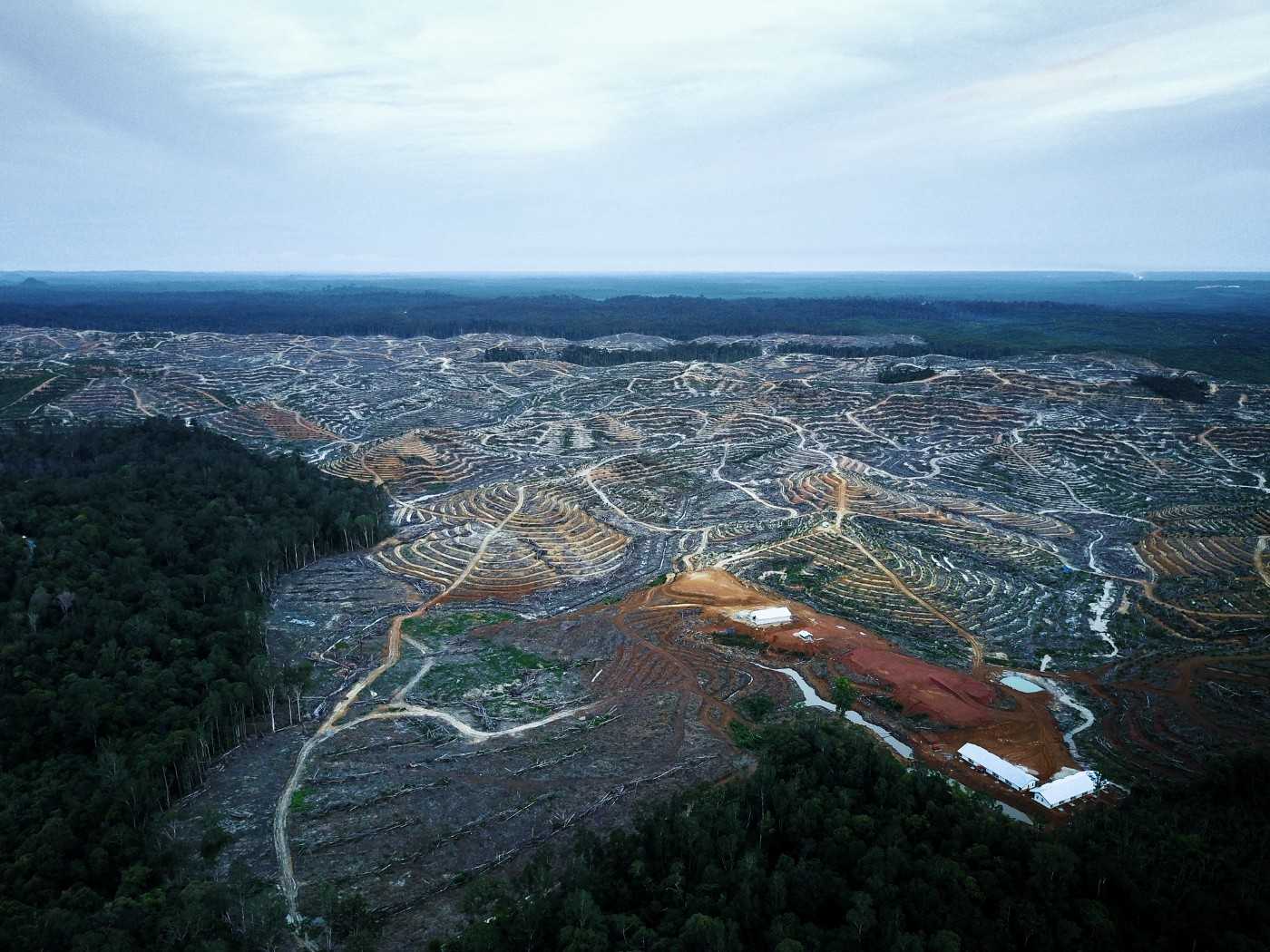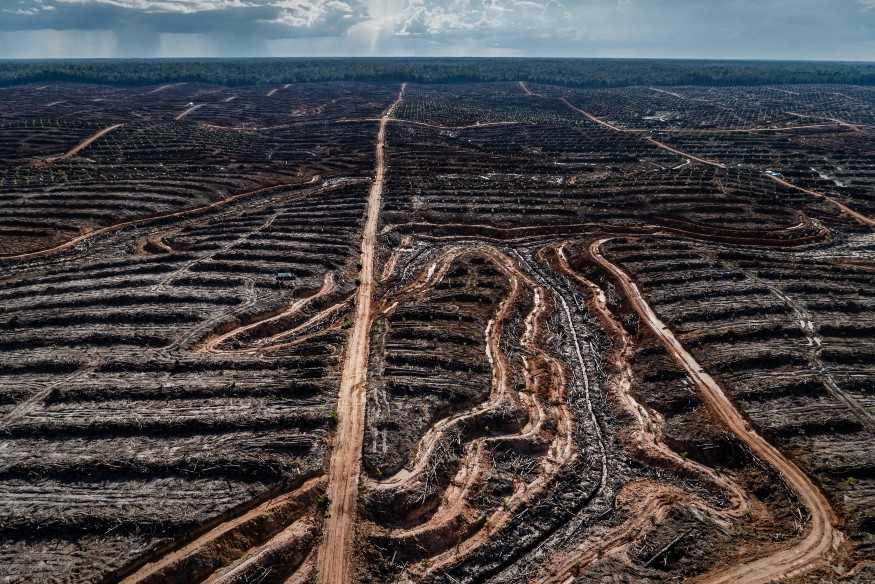- An investigation released today by The Gecko Project and Mongabay reveals the deep connections between the international palm oil industry and the corruption of Indonesian democracy.
- Some of the biggest firms in the industry, that are supplying supermarkets in the EU and US, are buying palm oil from plantations linked to corrupt politicians.
- Six million hectares of rainforest and carbon-rich peatlands remains in licenses issued in opaque circumstances. If the role of corruption is confronted, through action in Indonesia, by overseas consumer companies and the international community, much of this forest could be saved.
Two decades on from the fall of the Suharto dictatorship, Indonesia’s transition to democracy is regarded as a global success story. But lurking beneath the surface is an ugly truth. A now irrefutable body of evidence shows that regional elections, for the town mayors, district chiefs and provincial governors who hold huge sway over the lives of citizens in a decentralised state, are overwhelmingly corrupted by dark money.
Political scientists, civil society observers and enforcement agencies have documented the race to the bottom as candidates compete to outspend one another, employing an array of nefarious and illegal methods collectively referred to as “money politics”. Indonesia Corruption Watch, a non-profit that monitors elections across the country, has described regional elections as “brutal and shambolic”. Many informed observers believe the phenomenon is growing worse.
This system pushes to the top of the pile the candidates with the greatest tolerance for the dark arts of money politics and the ability to find wealthy backers. A study released earlier this year by the KPK, Indonesia’s anti-graft agency, found the majority of candidates are forced to make Faustian bargains with private interests to generate the funds required to mount a serious challenge. The donors want something in return: government contracts, jobs, policy influence and, above all, business licenses.
Across much of rural Indonesia, the most valuable commodity these corrupt politicians have to offer is land. The largest demand for that land, meanwhile, is for the development of giant plantations. Predominantly to produce palm oil, a commodity used around the world in everything from soap and ice cream to laundry detergent and biodiesel
Over the past 16 months, Mongabay and Earthsight’s The Gecko Project have investigated the role of plantation companies in driving this crisis. The birth of the current strain of money politics in Indonesia is pegged to the point at which district chiefs obtained control over licensing for oil palm plantations. In the time since, plantation firms have amassed control of 21 million hectares of land — more than 10 percent of the country. And yet, until now, the prospect that this is more than just a correlation has gone unexplored.
Indonesia is now the leading exporter of palm oil. But this has come at a considerable cost. The nation is a world leader in tropical deforestation, and oil palm expansion is a principal cause. In addition to destroying biodiversity and making a major contribution to global greenhouse gas emissions, the industry is also having devastating impacts on indigenous and other rural peoples. The government has recorded some 8,000 conflicts over land, and the industry’s growth has been marked by a litany of human rights abuses.

A long list of policies, in Indonesia, internationally and within the industry, have so far failed to stem these problems. Our investigations, which look in unprecedented detail at exactly how the industry operates, point to a crucial reason why.
Our findings, published in two in-depth stories to date, show that the trade-off — of environmental and social harm for economic growth — isn’t inevitable or necessary. It’s a consequence of collusive relationships between plantation firms and district chiefs. Palm oil cash has led to the election of politicians who take decisions in the interests of the industry, increase the area of land ceded to companies and then fail to regulate them. The twin problems of money politics and unbridled oil palm expansion, our investigations show, are inextricably linked and mutually reinforcing.
The second of our in-depth articles is released today. Ghosts in the machine reveals how the industry is connected to the highest-profile electoral scandal in Indonesia’s democratic era. It began in October 2013, when the chief justice of the nation’s highest court was arrested, caught red-handed taking a US$250,000 bribe to decide an election dispute in favour of an incumbent district chief from the island of Borneo. The ensuing scandal electrified Indonesia, made global headlines, provoked an intervention from the president, and led to the judge being jailed for life. But the source of the money went undiscovered.
We traced the money back to a series of land deals, cut in the months leading up to the election, which placed a vast area of land under the control of a palm oil firm from Malaysia. That land is inhabited and claimed by thousands of indigenous people, and includes a choice cut of the best rainforest left on Borneo. While the politician who paid the bribe was jailed, those land deals remained untouched. The forests are still in the process of being bulldozed today.
This latest case is far from unique. It contains many parallels with our first story, The making of a palm oil fiefdom. And our investigations have already taken us far beyond the two cases we have now published. They have led us to the palm oil frontier in the far east of Indonesia, and deep into the heart of the industry itself. Every indication is that the rot goes deep; that these are not isolated cases, but exemplify a problem hard-baked into the way the industry functions.
These are not rogue elements disconnected from the industry’s mainstream. The world’s leading palm oil trader and one of the largest consumer goods firms, for example, are both doing business with the company implicated in Ghosts in the machine. Our investigations show that palm oil linked to the subversion of Indonesian democracy is flowing around the world, including to markets that have sought unsuccessfully to rid their supply chains of deforestation and land grabbing.
Solutions are there to be found. Indonesian President Joko Widodo is reportedly on the cusp of mandating a review of all plantation licenses in the country. Some 6 million hectares of rainforest and carbon-rich peatlands in areas encumbered by licenses remains unexploited. If the government can investigate, expose, and ultimately revoke those connected to corruption, much of this natural heritage could be spared. In some parts of the country, grassroots movements have also had huge success in fighting back against the nexus of predatory politics and plantations.
It isn’t too late to save Indonesia’s rainforests, or its democratic project. But the success of both is intertwined. The ability of palm oil companies to foster land conflicts and destroy the environment should no longer be viewed in isolation from their control over politicians. Efforts to stem the flood of money into elections must consider the role of plantation firms that, to date, have escaped untouched even as the district chiefs that granted them licenses have been jailed for other scandals.
These are fundamentally Indonesian problems that must be solved, ultimately, by the nation’s own people and government. But the fate of the climate and democracy, the treatment of indigenous peoples, and the way we produce food in a globalised system are all questions that transcend borders. Much of the finance and demand for palm oil, the drivers that bookend its production, come from outside Indonesia. The financiers, the buyers and the global community can no longer turn a blind eye to the corruption at the root of this crisis.
To see further stories in the Indonesia for Sale series, as well as short films and picture stories, follow us on Facebook and Instagram. To get more updates from The Gecko Project as they come in, sign up to our mailing list.
